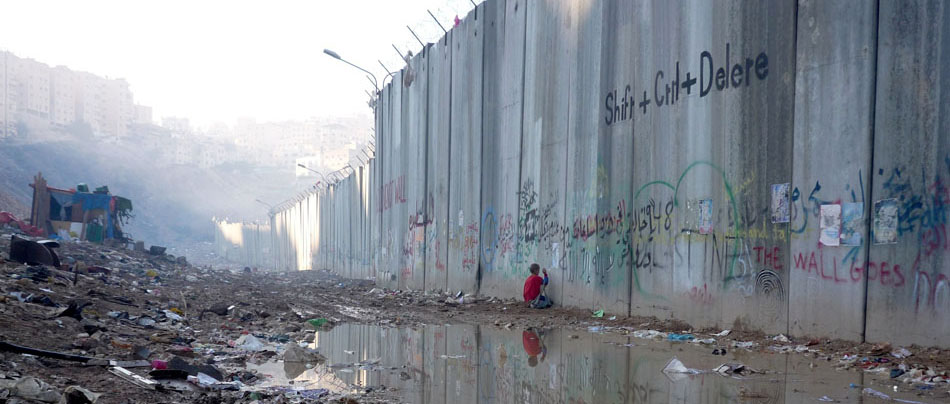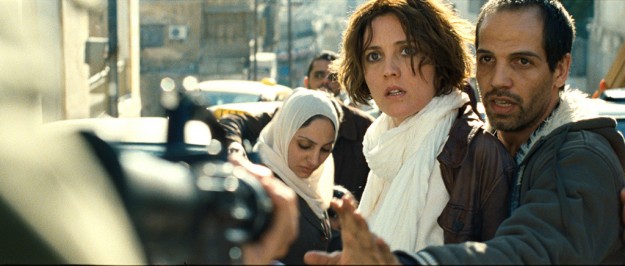 One of many politically charged films making its premiere at this year’s Toronto International Film Festival, Anais Barbeau-Lavalette’s Inch’Allah is a daring and stark look at the tumultuous Israel-Palestine conflict. The Canadian feature starring Quebecois actress Evelyne Brochu, Sabrina Ouazani, and Sivan Levy follows the story of Chloé (Brochu), a Canadian doctor working in Ramallah with Palestinian citizens, and with the UN, while living in Jerusalem. As her relationship with her patients deepens and she learns firsthand the nature of life in the occupied territories, Chloé is exposed to the dire dichotomy of life within the dual worlds of Israel and Palestine.
One of many politically charged films making its premiere at this year’s Toronto International Film Festival, Anais Barbeau-Lavalette’s Inch’Allah is a daring and stark look at the tumultuous Israel-Palestine conflict. The Canadian feature starring Quebecois actress Evelyne Brochu, Sabrina Ouazani, and Sivan Levy follows the story of Chloé (Brochu), a Canadian doctor working in Ramallah with Palestinian citizens, and with the UN, while living in Jerusalem. As her relationship with her patients deepens and she learns firsthand the nature of life in the occupied territories, Chloé is exposed to the dire dichotomy of life within the dual worlds of Israel and Palestine.
As emotionally poignant as it is damning, Inch’Allah is a wonderfully crafted film that will move you in a way unlike most films revolving around terrorism and conflict. It is an uncompromising look at the collateral of the decades-old conflict in the Middle East, venturing outside the realm of politics and political biases and presenting a realistic portrayal of the human cost of this conflict.
Though Inch’Allah is writer/director Anais Barbeau-Lavalette’s only second full-length feature, it is one that is masterfully crafted, combining awe-inspiring performances with gritty, visceral exposition, and truly inspired storytelling. Vividly capturing the juxtaposition of life in the hopeless shantytowns of the occupied Palestinian territories and the relatively vibrant and lively hustle and bustle of Jerusalem and Tel Aviv, the most stark aspect of Inch’Allah is its depiction of these two very different worlds. In one, citizens are reduced to morlocks, forced to trudge through dumps and subjugation in the name of basic survival, wherein the other is defined by a lavish, joyous way of life that is eternally tempered by an ardent insecurity.
Not seeking to take sides, this film instead seeks to make only one major statement: The situation is inhumane on both ends. And it is through the perspective of an outsider—played wonderfully in a tour-de-force performance by the striking Evelyne Brochu—that the audience is guided through the inhumanity. Brochu is simply brilliant in this film, conjuring both superhuman strength and barren emotional frailty in nearly every single second she is onscreen—the duality of her character mirroring the cruel one of life in Israel-Palestine.
Equally powerful is French actress Sabrina Ouazani, who plays Rand, a pregnant Palestinian woman under Chloé’s care. As one of the primary human conduits to express the effect of Israeli occupation on Palestinian society, Ouazani’s character arc is one of the most heart-wrenching plotlines to develop in a film in recent memory and is a performance that will haunt you for days to follow.
Pieced together like a classic tragedy, where strings and strands flow inch by inch throughout the story before colliding and culminating in a rousing and painful climax, Inch’Allah is quite possibly the best Canadian film so far this year and is one of the absolute can’t-miss films of TIFF 2012. Following in the tradition of the work produced by the lauded-Canadian film house micro_scope—which produced last year’s Oscar-nominated Monsieur Lazhar and 2010’s winner for Best Foreign Film Incendies—Inch’Allahwill no doubt garner a great deal of attention when award season begins, and rightfully so. This is a film that encompasses everything that defines truly inspired and inspiring cinema. If you have the opportunity to check it out during its engagement at this year’s TIFF, do not pass it up as it is a tale that will stick with you for a long time after the lights return and the curtain rises.
By Asif Hameed in «Movies, weekly special»
Anaïs Barbeau-Lavalette’s searingly effective drama Inch’Allah assumes the perspective of Chloë (Evelyne Brochu), a Quebecoise physician stationed in a UN-backed medical clinic, in post- Intifada, ODS-era Ramallah. She spends her days amid hellish conditions, tending to the medical and emotional needs of Palestinian captives, and bearing a burden that far outstrips the capacities of one individual. Post-sundown, the young woman regularly retires to her home in Jerusalem, where she enjoys the local nightlife with a friend, Ava (Sivan Levy). As the days pass, Chloë finds herself drawn into the lives of an angry Palestinian activist named Faysal (Yousef Sweid), and his sister Rand (Sabrina Ouazani) – an expectant mother whose husband awaits trial and sentencing in an Israeli jail.
As Lavalette’s premier feature Le Ring demonstrated, the writer-director is not only comfortable with situations that lack an easy resolution – she thrives on them. In that debut picture, we witnessed a pre-teenager struggling to fight the ills wrought by poverty and making increasingly desperate attempts to escape, crippled by a child’s naivete. In Inch, the artist broadens her focus and heightens her ambition: here, her concerns are not the socioeconomic disadvantages plaguing a single familial unit, but the religious, political and cultural tumult that has torn an entire region shreds since Israel’s incorporation in 1945 – and that seems fated to continue until the end of time.
In order to work properly onscreen,the story of Inch’Allah necessitates even greater despair and hopelessness than Le Ring did. In this sense, the writer-director proves herself worthy of the subject: if, in Lavalette’s prior film, we at least had something tangible to hope for, and a ray of optimism in the denouement, in Inch we get no such satisfaction, and that’s entirely appropriate. At the outset of the story, Chloë exudes what may initially seem like the most appropriate response to the Middle Eastern conflict: political neutrality. Guided by UN policies, the doctor approaches her days at the medical clinic as completely unbiased, unattached, and unwilling to take sides on the Palestinian-Israeli issue. Yet Lavalette shows us the futility of this choice. Recalling a central theme of Haskell Wexler’s 1969 drama Medium Cool,Inch suggests that a lack of politicization is synonymous with reactionary behavior, and that the only appropriate response to the ongoing tragedies means picking a side. Yet when circumstances finally force Chloë to take a stand, it also means alienating tens of thousands of people who are culturally, theologically, and socioculturally opposed to her position. Accordingly, the side that Chloë finally does take emerges as no less immune to violence than the other. In other words, the film gives us a vile and satanic equation with no solution other than death itself.
Inch evinces directorial maturation in terms of the way that Lavalette handles onscreen emotion, as well: though we get the same trademark avoidance of sentimentality that characterized Le Ring and Lavalette’s court-métrage Ina Litovski,Inch‘s emotional structure is far trickier than either of those prior films. She builds her narrative around a character who is initially insouciant, and makes us one with Chloë, so that we also, at first, have nothing clear to latch onto, no palpable emotions; the tapestry-like chaos onscreen for the first 45 minutes or so has a numbing effect that defies us to care. In one brilliant pivotal sequence that occurs in mid-movie, however – a scene involving the birth of Rand’s baby – the emotional barriers suddenly come crashing down, for us, at the same moment that they collapse for Chloë. It’s a tear-jerking, heart-rending sequence, and all the more effective because the film earns this payload after letting the emotions well up inside of us and Chloe’s character for over an hour. Everything following this has a devastating effect, because we realize in retrospect how jaded we were before.
There is something transcendent, even magisterial, in the technique that lies at the center of this picture – Lavalette’s ability to gently guide us along a path of shifting perception and emotion along with her central character. We’ve all been inundated with the atrocities, crimes against humanity, and endless cycles of bloodshed in the Middle East – overcome to the point of almost complete collective anesthetization. It takes a very special film to force us to see the cataclysm in a new light, yet Inch does exactly that. Lavalette has created more than a conventional drama; though the film’s surface seems low-key and restrained, beneath it lies an unmistakable scream of anguish, of rage, of horror, that violently rips through one’s preconditioned responses toward the Mideast and calls with utter sanity and clarity for an end to the madness now plaguing Earth’s most beleaguered region. As such, this beautifully and cunningly-crafted motion picture is long overdue.
By Nathan Southern
